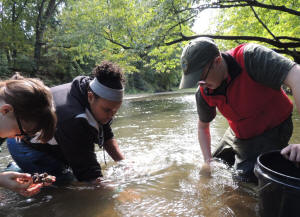
Illinois
RiverWatch Head Biologist Dr. Charlie Blake (right) helps
Lincoln College students sift the bed of Sugar Creek for
mussel species. The trio was part of a recent mussel survey
coordinated by Creekside Outdoor Center for Environmental
Education Director Dr. Dennis Campbell, who has been
monitoring the creek’s mussels for 20 years.
|
Illinois RiverWatch Network joins Lincoln College in mussel survey
 Send a link to a friend
Send a link to a friend
[November 08, 2018]
When Dr. Dennis Campbell, Director of Lincoln
College’s Creekside Center for Environmental Education, recently
organized a mussel survey in Sugar Creek, his group was joined by a
special guest. In addition to University of Illinois Extension
Master Naturalist volunteers, students and local volunteers, the
team included Dr. Charlie Blake, Biologist of the Illinois
RiverWatch Network.
|
|
Creekside has been a site for RiverWatch water quality surveys
since 2014, when Logan County Master Naturalist volunteers began
their annual water chemistry and invertebrate population
analyses. Dr. Campbell has also been conducting mussel species
studies in the same stream for more than twenty years. Therefore
when Dr. Blake decided to expand RiverWatch activities to
include detailed information on mussel populations, Creekside
was a logical place to do some preliminary observations. “I
always enjoy the chance to get out and work with the volunteers
who are vital to the stewardship of our natural resources,” she
explained, “And I love getting a chance to see the unique stream
habitats around Illinois. Mussels are a critically threatened
group of animals that can tell us a lot about what is going on
in our streams, and the Illinois RiverWatch Network is excited
to expand our opportunities for volunteer mussel monitoring in
the coming year.”
Dr. Campbell is also very concerned about the future of mussels
in our streams. His early surveys in Sugar Creek showed an
extremely large, diverse community with 18 living species found
in just a small stretch of the creek. Recent studies suggest
that some of these species may have been eradicated, and
Campbell urges that additional monitoring needs to go on. “It
has been particularly heartwarming that other organizations
share in our concern. Much credit should go to the intrepid
field workers including Master Naturalist volunteers and
RiverWatch, who were literally waist deep in our recent survey
and helped the Lincoln College students to complete the
monitoring tasks.”
[to top of second column] |

Master Naturalist Pam Moriearty, who has coordinated the local RiverWatch
invertebrate surveys, says she is looking forward to adding mussels to the
survey protocols. “We feel pretty much at home in the water by now,” she
admitted. “You get so caught up in the hunt that you don’t notice you’re wet. “
Moriearty also points out that, “Our training is very helpful, but finding a
mussel buried in the creek bed is easier if you have an experienced eye, and
species identification is tricky. We submit photos and samples with our report,
so they help us avoid mistakes. But nothing beats an on-site expert. Dennis
really knows his mussels.”
Volunteer training for both the invertebrate and mussel surveys is being
scheduled for spring of 2019. Anyone interested in becoming a Citizen Science
volunteer for RiverWatch can find detailed contact information at http://www.ngrrec.org/riverwatch/
. To learn more about Creekside, see https://lincolncollege.edu/creekside/.
[Jennifer Fishburn
Horticulture Educator
University of Illinois Extension
Photo by Bev Noble] |